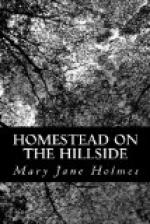CHAPTER I.
Mrs. Hamilton.
For many years the broad, rich acres, and old-fashioned, massive building known as “The Homestead on the Hillside,” had passed successively from father to son, until at last it belonged by right of inheritance to Ernest Hamilton. Neither time nor expense had been spared in beautifying and embellishing both house and grounds, and at the time of which we are speaking there was not for miles around so lovely a spot as was the shady old homestead.
It stood at some distance from the road, and on the bright green lawn in front were many majestic forest trees, on which had fallen the lights and shadows of more than a century; and under whose widespreading branches oft, in the olden time, the Indian warrior had paused from the chase until the noonday heat was passed. Leading from the street to the house was a wide, graveled walk bordered with box, and peeping out from the wilderness of vines and climbing roses were the white walls of the huge building, which was surrounded on all sides by a double piazza.
Many and hallowed were the associations connected with that old homestead. On the curiously-carved seats beneath the tall shade trees were cut the names of some who there had lived, and loved, and passed away. Through the little gate at the foot of the garden and just across the brooklet, whose clear waters leaped and laughed in the glad sunshine, and then went dancing away in the woodland below, was a quiet spot, where gracefully the willow tree was bending, where the wild sweetbrier was blooming, and where, too, lay sleeping those who once gathered round the hearthstone and basked in the sunlight which ever seemed resting upon the Homestead on the Hillside.
But a darker day was coming; a night was approaching when a deep gloom would overshadow the homestead and the loved ones within its borders. The servants, ever superstitious, now whispered mysteriously that the spirits of the departed returned nightly to their old accustomed places, and that dusky hands from the graves of the slumbering dead were uplifted, as if to warn the master of the domain of the desolation; which was to come. For more than a year the wife of Ernest Hamilton had been dying—slowly, surely dying—and though when the skies were brightest and the sunshine warmest she ever seemed better, each morning’s light still revealed some fresh ravage the disease had made, until at last there was no hope, and the anxious group which watched her knew full well that ere long among them would be a vacant chair, and in the family burying ground an added grave.
One evening Mrs. Hamilton seemed more than usually restless, and requested her daughters to leave her, that she might compose herself to sleep. Scarcely was she alone when with cat-like tread there glided through the doorway the dark figure of a woman, who advanced toward the bedside, noiselessly as a serpent would steal to his ambush. She was apparently forty-five years of age, and dressed in deep mourning, which seemed to increase the marble whiteness of her face. Her eyes, large, black, and glittering, fastened themselves upon, the invalid with a gaze so intense that Mrs. Hamilton’s hand involuntarily sought the bell-rope, to summon some one else to her room.




